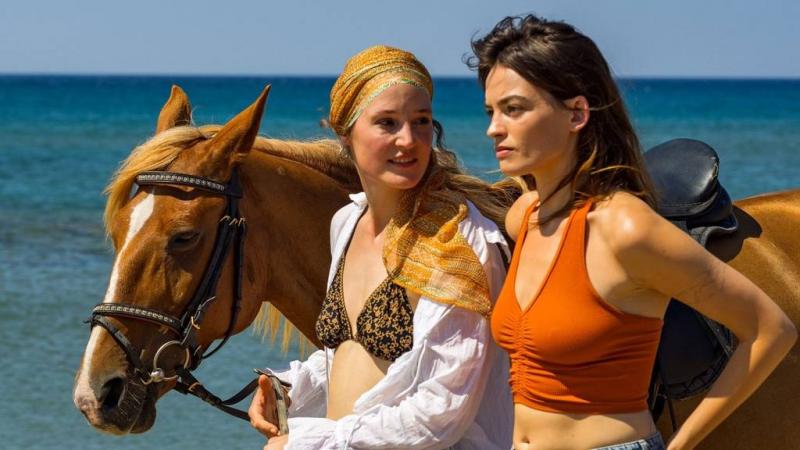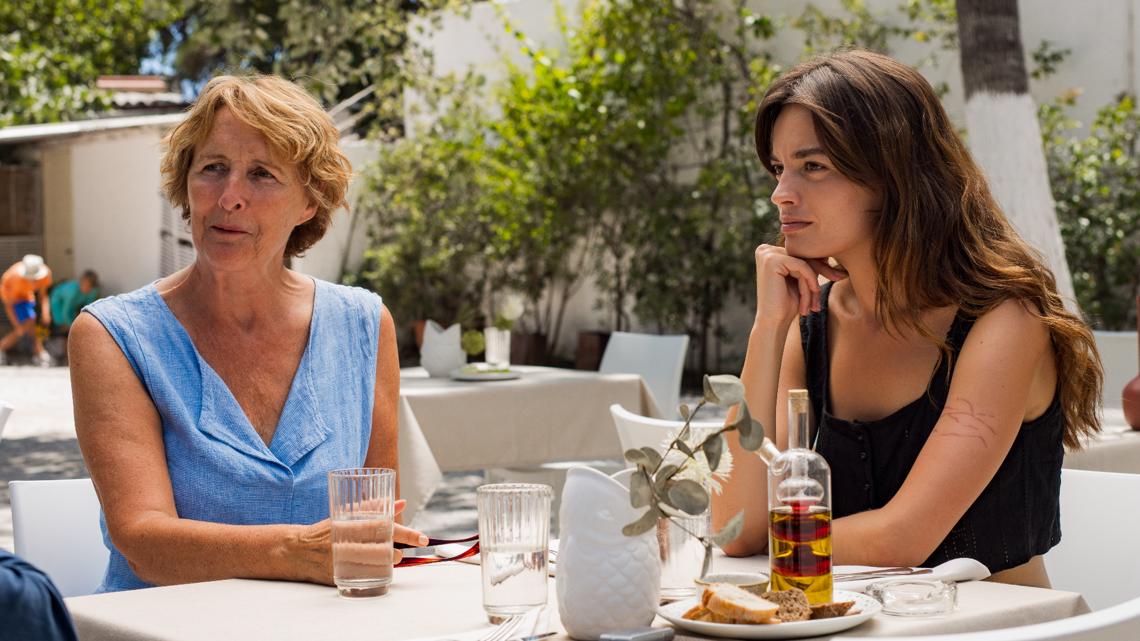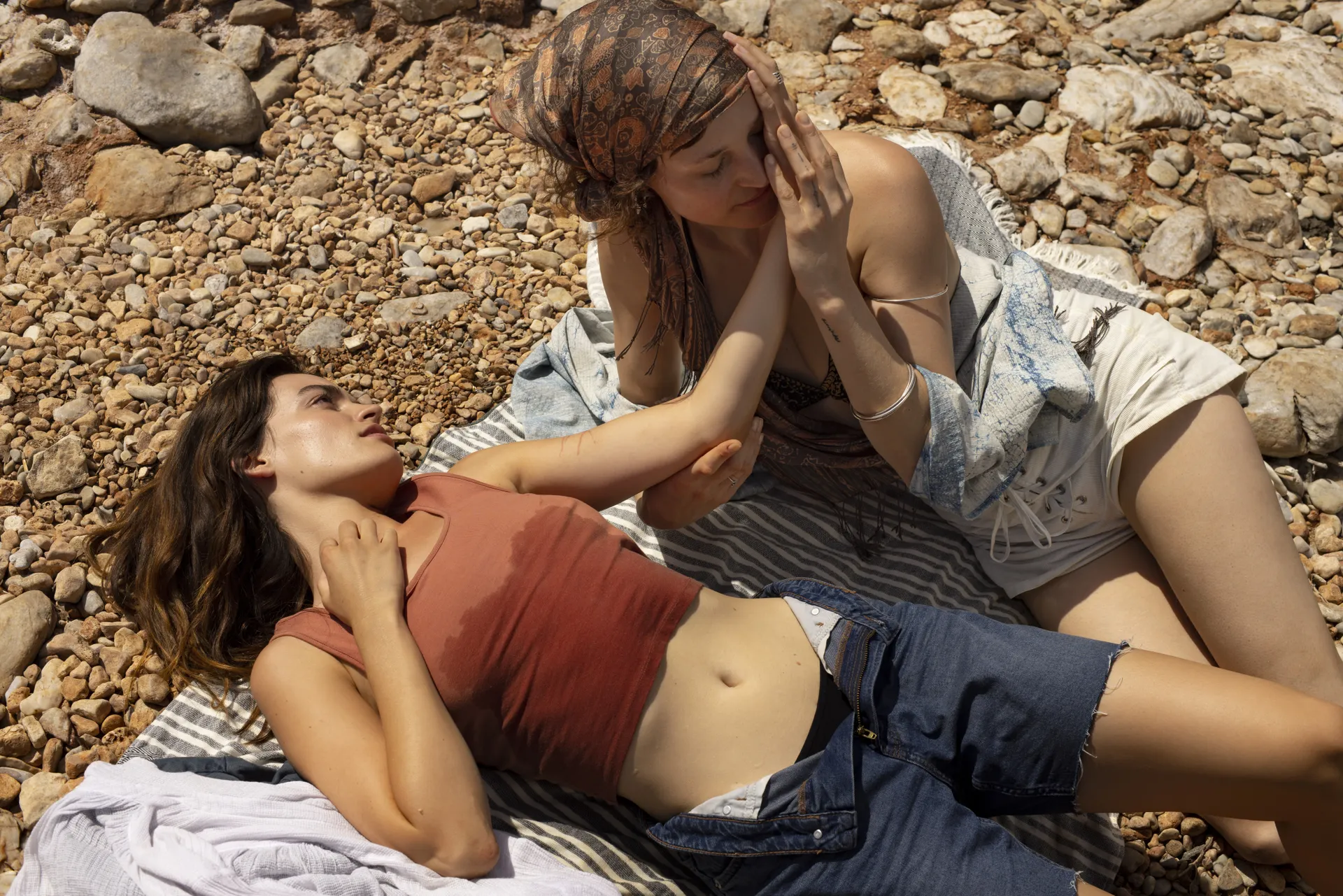Hot Milk review - a mother of a problem | reviews, news & interviews
Hot Milk review - a mother of a problem
Hot Milk review - a mother of a problem
Emma Mackey shines as a daughter drawn to the deep end of a family trauma

Rebecca Lenkiewicz’s Hot Milk, adapted from Deborah Levy’s 2016 Man Booker shortlistee, has been described as a "psychological drama". Strictly speaking, it's a psychoanalytic one – a clue-sprinkled case study, involving talk therapy, of a woman whose repressed trauma has confined her to a wheelchair for 20 years.
She’s so querulous and demanding that whether she gets up and walks at the end matters less to the viewer than her frustrated caregiver daughter’s ability to free herself from Mum’s mind-forged manacles. The world belongs to the young, after all.
Former librarian Rose (Fiona Shaw), 64, has dragged the long-suffering Sofia (Emma Mackey) from London to Almeria, where she hopes €25,000 will buy her a cure from the shaman-like shrink Dr. Gomez (Vince Perez) at his clinic. Sofia is sceptical, inured as she is to the possibility that Rose’s psychosomatic illness was self-willed to facilitate her tactical withdrawal from the hateful world. (Pictured below: Fiona Shaw and Emma Mackey)
 To minister to Rose, Sofia has postponed completion of her PhD in anthropology and taken a coffee shop job. Beaching solo in Spain brings her no relief. She can't even get a smile from the handsome medic who, treating her for a jellyfish sting, ignores the sight of her bikini top slipping and her coy apology.
To minister to Rose, Sofia has postponed completion of her PhD in anthropology and taken a coffee shop job. Beaching solo in Spain brings her no relief. She can't even get a smile from the handsome medic who, treating her for a jellyfish sting, ignores the sight of her bikini top slipping and her coy apology.
No matter. When Sofia is next sunbathing, up rides insouciant Ingrid (Vicky Krieps) and gazes down on her. The moment strongly recalls the meet cute of prostrate daydreamer Mona (Natalie Press) and mounted Tamsin (Emily Blunt) in My Summer of Love (2004), directed by Paweł Pawlikowski (with whom Lenkiewicz co-wrote 2013’s Ida). Like that mismatched teenage pair, Sofia and Ingrid start an affair. Ingrid proves as elusive and unreliable as Tamsin.
Enhancing her femme fatale credentials, she confesses to Sofia that she has killed someone. She is not a vacationing murderess, though, but another tormented intimate for whom Sofia must bear witness. That Ingrid’s trauma correlates with Rose’s feels contrived, but this doesn’t impair Sofia’s all-important evolution as a woman chasing liberation.
Rose denounces Sofia’s plan to visit her Greek father, who abandoned her and Rose years before and has a new family. She makes it anyway. The trip prompts her to help Gomez discover the maternal source of Rose’s woes, which were socially induced in the 1950s Ireland where she grew up.
A powerful dramatist and screenwriter – Disobedience (2017), Colette (2018), She Said (2022) – Lenkiewicz links Hot Milk intertextually with her Sligo-set Chekhovian play The Night Season (2004). Rose, born a Kennedy, is seemingly an amalgam of two of the play’s three Kennedy sisters, one also named Rose and another a librarian; their student sister must be Lenkiewicz’s (if not Levy’s) prototype for Sofia.
As a first-time director, Lenkiewicz has made a deceptively sunlit anti-idyll that's dense – almost too dense – with symbolism and references. It's as overdetermined as a dream.
Sofia identifies with a trapped dog and with the therapeutic art of Louise Bourgeois, who was psychosexually traumatised in childhood by her father’s affair with her nanny. The jellyfish equates with Bourgeois’s spider scuptures, which represented the artist's protective-predatory tapestry-weaving mother.
The snake that makes Sofia start outside the shack that Ingrid shares with her male lover? A bit obvious. We’re deep into Electra Complex territory here, as explored in Aeschylus’s matricidally themed The Libation Bearers. A shot of Sofia and Rose lying together en plain air quotes the realist painter Gustave Courbet's 1857 Salon shocker Young Ladies on the Banks of the Seine (Summer). (Pictured below: Emma Mackey and Vicky Krieps)
 Since Sofia has been studying Margaret Mead, Lenkiewicz interpolates images from Mead and her fellow anthropologist Gregory Bateson’s 1937 film of a Balinese trance dance. It presents the story of a witch so enraged by the king's refusal of her daughter that she instructs her pre-adolescent female acolytes to spread a plague; they end up stabbing (but not wounding) themselves. Rose’s masochistic wrath has done greater damage to her and Sofia. Her failed parenting and her repression recall that of the Olivia Colman character’s in Maggie Gyllenhaal’s like-minded The Lost Daughter (2021).
Since Sofia has been studying Margaret Mead, Lenkiewicz interpolates images from Mead and her fellow anthropologist Gregory Bateson’s 1937 film of a Balinese trance dance. It presents the story of a witch so enraged by the king's refusal of her daughter that she instructs her pre-adolescent female acolytes to spread a plague; they end up stabbing (but not wounding) themselves. Rose’s masochistic wrath has done greater damage to her and Sofia. Her failed parenting and her repression recall that of the Olivia Colman character’s in Maggie Gyllenhaal’s like-minded The Lost Daughter (2021).
Like John Wayne, say, Mackey is a great reactor, as she showed portraying the cruelly wuthered title character in the Brontë sister biopic Emily (2022). She perfected her world-class glower and combat boot stomp as "scary" Maeve in Sex Education (2019-23), herself burdened with a checked-out mother, and she uses them effectively in Hot Milk, surly Sofia's foot-pounding scorning Rose’s lameness. Pushed to the limits, forced into a dual detective role she doesn’t want, Sofia sometimes explodes, though Mackey internalises throughout the effect on her of pell-mell emotions and revelations.
Shaw brings perverse wit to her portrayal of the self-lacerating Rose. Krieps’s turn as the exasperatingly mercurial Ingrid is consciously self-conscious. Together, the three weave a dark tangled web that’s hard to brush off.
The future of Arts Journalism
You can stop theartsdesk.com closing!
We urgently need financing to survive. Our fundraising drive has thus far raised £49,000 but we need to reach £100,000 or we will be forced to close. Please contribute here: https://gofund.me/c3f6033d
And if you can forward this information to anyone who might assist, we’d be grateful.

Subscribe to theartsdesk.com
Thank you for continuing to read our work on theartsdesk.com. For unlimited access to every article in its entirety, including our archive of more than 15,000 pieces, we're asking for £5 per month or £40 per year. We feel it's a very good deal, and hope you do too.
To take a subscription now simply click here.
And if you're looking for that extra gift for a friend or family member, why not treat them to a theartsdesk.com gift subscription?
more Film
 Oslo Stories Trilogy: Sex review - sexual identity slips, hurts and heals
A quietly visionary series concludes with two chimney sweeps' awkward sexual liberation
Oslo Stories Trilogy: Sex review - sexual identity slips, hurts and heals
A quietly visionary series concludes with two chimney sweeps' awkward sexual liberation
 Sorry, Baby review - the healing power of friendship in the aftermath of sexual assault
Eva Victor writes, directs and stars in their endearing debut feature
Sorry, Baby review - the healing power of friendship in the aftermath of sexual assault
Eva Victor writes, directs and stars in their endearing debut feature
 Blu-ray: Who Wants to Kill Jessie?
Fast-paced and visually inventive Czech comedy
Blu-ray: Who Wants to Kill Jessie?
Fast-paced and visually inventive Czech comedy
 Oslo Stories Trilogy: Love review - freed love
Gay cruising offers straight female lessons in a heady ode to urban connection
Oslo Stories Trilogy: Love review - freed love
Gay cruising offers straight female lessons in a heady ode to urban connection
 Beating Hearts review - kiss kiss, slam slam
Romance and clobberings in a so-so French melodrama
Beating Hearts review - kiss kiss, slam slam
Romance and clobberings in a so-so French melodrama
 Materialists review - a misfiring romcom or an undercooked satire?
Writer-director Celine Song's latest can't decide what kind of film it is
Materialists review - a misfiring romcom or an undercooked satire?
Writer-director Celine Song's latest can't decide what kind of film it is
 theartsdesk Q&A: actor Leonie Benesch on playing an overburdened nurse in the Swiss drama 'Late Shift'
The Guildhall-trained German star talks about the enormous pressures placed on nurses and her admiration for British films and TV
theartsdesk Q&A: actor Leonie Benesch on playing an overburdened nurse in the Swiss drama 'Late Shift'
The Guildhall-trained German star talks about the enormous pressures placed on nurses and her admiration for British films and TV
 Freakier Friday review - body-swapping gone ballistic
Lindsay Lohan and Jamie Lee Curtis's comedy sequel jumbles up more than their daughter-mother duo
Freakier Friday review - body-swapping gone ballistic
Lindsay Lohan and Jamie Lee Curtis's comedy sequel jumbles up more than their daughter-mother duo
 Eight Postcards from Utopia review - ads from the era when 1990s Romania embraced capitalism
Radu Jude's documentary is a mad montage of cheesy TV commercials
Eight Postcards from Utopia review - ads from the era when 1990s Romania embraced capitalism
Radu Jude's documentary is a mad montage of cheesy TV commercials
 The Kingdom review - coming of age as the body count rises
A teen belatedly bonds with her mysterious dad in an unflinching Corsican mob drama
The Kingdom review - coming of age as the body count rises
A teen belatedly bonds with her mysterious dad in an unflinching Corsican mob drama
 Weapons review - suffer the children
'Barbarian' follow-up hiply riffs on ancient fears
Weapons review - suffer the children
'Barbarian' follow-up hiply riffs on ancient fears

Add comment